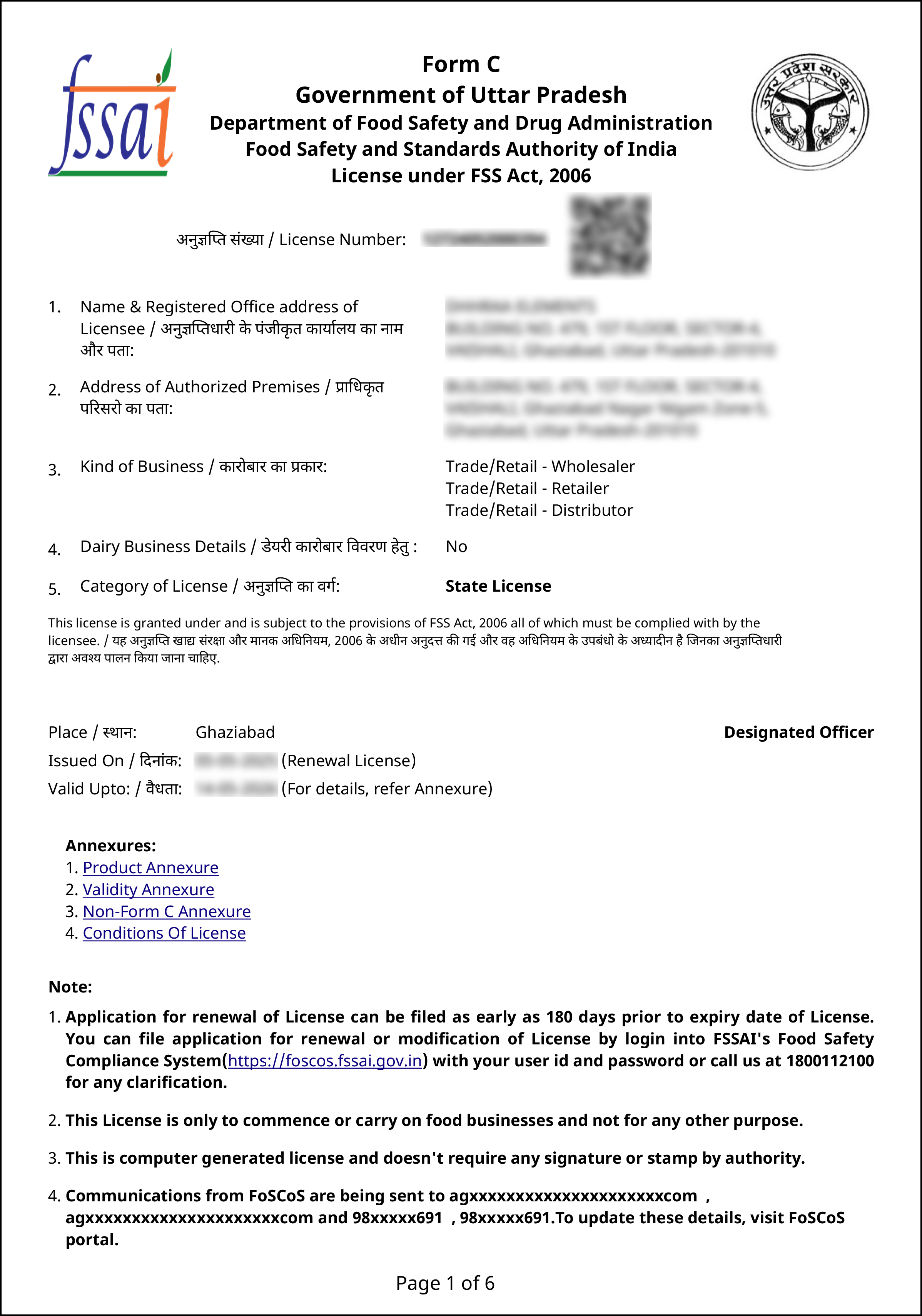
Get Instant Solution By an Expert Advisor
(4.8)
The FSSAI License is the most important registration for food businesses, involved in the manufacture, distribution, and retail of food products in India. The Food Safety and Standards Authority of India is the full form of FSSAI, which oversees and ensures the safety and quality of food for the public. The license is categorized into three types: basic, state, and central, depending on the size of the food business. Obtaining a secure FSSAI license in India, involves a thorough verification procedure, including inspections, document checks, and adherence to hygiene standards. This certification is not only a legal obligation; it also shows that the company is dedicated to maintaining high standards of safety and quality of food. The FSSAI logo on food products builds consumer trust and confidence when it is displayed on food products and indicates that the food has undergone regulatory scrutiny for safety and adherence to quality standards.


10000 +
Projects Completed for Our Respected Clients.
15 +
Years Experienced Advisors in Indian Compliance.
98.9%
Project Delivery Ratio for Our Valuable Clients.
99.9%
Satisfied Customers All Over India.
Do you often eat at restaurants and eateries or do you love to visit your favourite snack center or café at weekends? Have you ever worried about the quality of the raw materials, the cooking process, and the hygiene & safety standards followed in order to ensure your health and safety? Despite this, there may be instances where food business entities may indulge in dishonest practices of improper hygiene for food preparation or mixing lethal substances to quick their profits while risking lives at the same time, which required the introduction of proper guidelines specifying standards to maintain hygiene and methods of food preparation while affording quality & safety of food articles. With this objective in mind, the Union Government introduced the Food Safety and Standards Act of 2006.
Established by the Government of India under the Food Safety and Standards (FSS) Act 2006 and corresponding rules 2008, the Food Safety and Standards Authority of India (FSSAI) is a national regulatory authority entrusted with the functions of considering & approving the licensing of food business operating businesses and further monitoring compliances as per the laid down guidelines to afford quality & safe food articles for their consumption.
The objective of the FSSAI license is to clearly state the responsible person and specify their responsibility for upholding food product quality through licensing, inspection, and monitoring. Accordingly, every food business operator involved in the business of offering food articles or manufacturing food products for human consumption, either within one state or multiple states, is under the legal obligation to apply for and acquire FSSAI registration.

Regardless of the size or scale of the business, any individual or Food Business Operator (FBO) involved in or planning to establish a food-related venture must secure FSSAI registration depending upon several factors, such as the business location across states, its size, and its annual turnover.
Businesses, including those engaged in small to medium-scale manufacturing, storage, transportation, retail, restaurants, marketing, distribution, etc. with annual turnover above Rs. 12 lakh, shall make an application for the FSSAI State License. Whereas, businesses holding an annual turnover above Rs. 20 crore shall compulsorily obtain a Central FSSAI license for manufacturing, trading, and storage purposes.
Ensuring Consumer Confidence in Quality: Establishing trust and nurturing a positive connection with customers holds immense significance for any food enterprise. Even a minor flaw or shortcoming could result in shifting profits to losses. Hence, holding an FSSAI certificate can assure adherence to safety norms and food quality standards.
This, in turn, has the potential to cultivate a lasting and contented rapport between the food business operator (FBO) and consumers about the food products crafted, manufactured, distributed, or presented for sale.
Drawing in Investors and Sponsors for the Business: It is evident that enterprises engaged in the production, sale, import, or export of food items, or those closely associated with such activities, inherently gain credibility due to their commitment to quality products, positive reputation, substantial consumer following, and prospects for growth.
Consequently, potential investors are more likely to select these types of enterprises for investment due to their promising viability and profit potential.
Enhanced Market Reach: Numerous retailers and food service establishments demand suppliers possess a valid FSSAI license, which allows the business to tap into a broader market.
Competitive Benefit: Holding a food license provides enterprises with a competitive advantage, especially within the food sector, in comparison to unregistered rivals.
Prospects for Business Growth: Possessing an FSSAI license frequently serves as a prerequisite for business expansion, the establishment of new outlets, or engaging in collaborative ventures.
Prior to commencing the FSSAI registration procedure for your food enterprise, it's essential to understand the kind of registration that suits your needs, contingent upon factors like the scale of your business, yearly earnings, and geographical reach across the country. There are three categories of FSSAI registration:
Basic FSSAI Registration: Typically, this form of registration is intended for smaller food businesses or those with modest turnovers. This includes small-scale food-related ventures with annual earnings up to Rs. 12 lakh meeting one of the following criteria:
FSSAI State License: Food businesses, operators, startups, or entities not covered by the aforementioned category are required to obtain either a State or a Central License. Furthermore, food enterprises with annual turnovers ranging from Rs. 12 lakh - 20 crore and operating within a single state should seek a State License. This entails submitting Form B along with the required documents in the specified format.
FSSAI Central License: Primarily targeted at substantial food operators or enterprises linked to the food sector, catering to the requirements of major entities such as the Indian railways and similar entities. A food business operator (FBO) with business activities spanning two or more states and an annual turnover exceeding Rs. 20 crore is mandated to secure a central license. Moreover, all importers or exporters of food products are obliged to obtain a central license, which necessitates the submission of Form B along with the required documents in the stipulated format.
FSSAI Form D1 (Yearly Report): Every importer, producer, packer, labeller, re-labeler, and re-packer within the food industry is obligated to submit Form D1 to the FSSAI licensing body. This form, D1, can be submitted electronically or in hard copy format, as directed by the food safety commissioner. All food business operators (FBOs) are required to submit Form D1 without exception, regardless of their production involvement, based on the kind of food items they sold during the previous fiscal year.
FSSAI Form D2 (Semi-Annual Report): Form D2 constitutes a report to be submitted every six months. Food business operators engaged in the manufacture or import of milk or milk products are obligated to submit Form D2.
Note: Each food business operator (FBO) must submit an individual report for each license granted by FSSAI guidelines, regardless of whether the same FBO operates multiple food license units or businesses. Thus, if an FBO possesses multiple licenses under FSSAI, they are required to file distinct reports for each license. The fact that these FSSAI licenses are held by the same FBO is of no consequence.
Following the submission of the FSSAI License application, it typically takes approximately 60 to 90 days for the issuance of the license. Once approved & granted, the license shall be valid for a period of 1–5 years. The FSSAI license renewal application shall be filed at least 30 days before the date of the expiration of the FSSAI license.
Obtaining the FSSAI license could be a bit challenging due to the complex process of obtaining the documents required and the processes involved. However, with the right amount of guidance and consultation, you could easily acquire an FSSAI license or food license within the prescribed time. At Agile Regulatory, we are committed to helping budding entrepreneurs by enabling them to acquire business licenses smoothly and carry on their business.

Get Instant Solution By an Expert Advisor
(4.8)
The purpose of obtaining an FSSAI Registration license is to ensure that food-related businesses in India adhere to the safety and quality criteria established by the FSSAI.
Certainly, the FSSAI Registration license needs to be extended before its expiration to maintain ongoing operations, and the renewal application should be lodged at least 30 days before the license's expiry date.
No, FSSAI registration pertains to small-scale enterprises, while the FSSAI License applies to medium and large-scale businesses. Registration involves a simpler procedure and lower fees.
The FSSAI License could be subject to suspension or revocation if the food enterprise fails to adhere to the regulations governing the safety and quality of food.
Yes, if there is any change in the location, scale, or other relevant details, changes could be made to the FSSAI License.
FSSAI Food License is a mandatory certification in India for food business owners. It ensures compliance with food safety and quality standards. The license signifies adherence to regulations and guarantees that food served to consumers meets established health and safety criteria.
To apply for an FSSAI license registration in Noida, Uttar Pradesh, visit the FSSAI website and complete the online application. Submit required documents, such as ID proof and business details, through the FSSAI portal. Pay the registration fee, and await inspection and approval from the local FSSAI office for final licensing.
Proven 4-step Process: Consultation, Documentation, Submission, and Certification.
Startups to large enterprises, we deliver end-to-end solutions business compliance needs.

What our customer says about us
Fantastic support from the team. Their expertise transformed our approach, driving remarkable outcomes. A must-have partner for businesses seeking effective consulting solutions. Highly recommended.

Lavkush Sharma
KTPL Instruments
Agile Regualtory delivers exceptional solutions. Their insightful guidance streamlined our processes and boosted profitability. Highly recommended for businesses seeking expert consulting services to thrive.

Nitin Mukesh
Justrack IOT
Impressed by Agile Regulatory's expertise. Their strategic insights and practical solutions have elevated our business operations. A reliable partner for effective consulting services. Highly recommended for growth-focused businesses.

Pradeep Varma
Coaire Compressor
Extraordinary consulting services. Their insightful solutions and dedicated team reshaped our business, driving remarkable improvements. Highly recommend it for transformative results.

Bharat Bachwani
Easy Polymer
Incredible experience with Agile Regulatory. Their innovative strategies and expert advice revitalized our business model, resulting in impressive growth. Highly recommend their exceptional consulting services.

Atul Jain
Tarus International
Top-tier consulting! offered strategic solutions that revolutionized our approach. Their deep expertise and personalized guidance made a significant impact on our success. Highly recommend their services.

Paramjeet Singh
Anchor Weighing
Agile Regulatory exceeded expectations! Their tailored solutions, expertise, and proactive approach led to remarkable results. Highly recommend for businesses seeking impactful and strategic guidance.

Anshul Rathi
AM Capacitor
Outstanding service! delivered targeted solutions with professionalism and expertise. Their insights elevated our business strategies, resulting in noticeable growth. Highly recommended for exceptional consultation.

Shekhar Maurya
Imaxx Pro Aquistic